|
|
|
Sort Order |
|
|
|
Items / Page
|
|
|
|
|
|
|
| Srl | Item |
| 1 |
ID:
117808
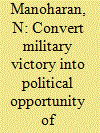

|
|
|
| 2 |
ID:
131631
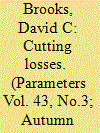

|
|
|
| 3 |
ID:
140943
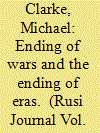

|
|
|
|
|
| Summary/Abstract |
When wars come to an end, even a decisive military victory does not necessarily translate into a decisive political outcome. Michael Clarke reflects on the nature of international warfare, systemic change, and the difficulties of defining with any clarity the outlines of ‘victory’ and ‘defeat’, especially in political terms.
|
|
|
|
|
|
|
|
|
|
|
|
|
|
|
|
| 4 |
ID:
117443
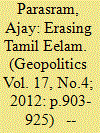

|
|
|
|
|
| Publication |
2012.
|
| Summary/Abstract |
This paper considers the Sri Lanka/Tamil Eelam conflict with attention to how its dramatic end can be explained through postcolonial territorial politics. I argue discourses of postcolonial nationalism and global terrorism aligned along domestic, regional, and international political levels to enable a military victory for the government of Sri Lanka. At the domestic political level, there was a change in government along with a split and defection within the LTTE command. At the international level, there was a turn away from Western allies due to their perceived inability to understand the needs of the Asian front in the global war on terror (GWOT). This led to a geopolitical realignment with China, a state sympathetic to fighting terrorism and secession movements. The case is studied under a theoretical lens of "de/re territorialisation" from Gilles Deleuze and Felix Guattari. De/re territorialisation reveals simultaneous efforts to inscribe nationalist meaning into territory in a constant process of "becoming."
|
|
|
|
|
|
|
|
|
|
|
|
|
|
|
|
| 5 |
ID:
109579
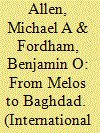

|
|
|
|
|
| Publication |
2011.
|
| Summary/Abstract |
Most bargaining models of war suggest that the absence of ex-ante uncertainty about the outcome of fighting should lead to negotiated outcomes rather than military conflict. Nevertheless, relatively weak states still refuse demands from dominant powers in many cases. This paper tests several explanations for this phenomenon. James Fearon's account of rationalist explanations for war suggests two reasons states might resist militarized demands even if there is little or no chance of military victory. First, the weaker state might not concede if the stronger state's threat is not credible. Second, guerrilla resistance to enemy occupation might create a commitment problem for the stronger state if it could impose costs that exceed the value of the stronger state's objectives. Alternative explanations that do not assume the state behaves as a unitary rational actor focus on special features of state preferences, such as the importance attached to political sovereignty and territorial integrity, or on the difficulties state institutions might pose for making the policy changes necessary to concede the more powerful state's demands. Empirical analyses of MID and ICB data point to the importance of both rationalist claims about threat credibility and alternative arguments about state preferences.
|
|
|
|
|
|
|
|
|
|
|
|
|
|
|
|
| 6 |
ID:
131019


|
|
|
|
|
| Publication |
2014.
|
| Summary/Abstract |
Sam Hormusji Framji Iamshedji Manekshaw was born in the holy city of Amritsar, on Friday, 3 April 1914, to Hormusji Manekshaw and his wife Heerabai. It was while studying medicine at Grant Medical College, Bombay that I-Iormusji met Heerabai and later married her. The couple, residents of Valsad, a small coastal town in Gujarat, thereafter migrated to Amritsar, in search of better opportunities. On that pleasant April day in Amritsar when Heerabai held Sam for the first time in her life, the fifth of six children she would have, little could she have imagined that the child in her arms was destined to make history. Three months later, in July, World War I broke out, and when the war ended in November 1918, Sam still had a few months to go for his fifth birthday. He was an infant in World War I, but he was to prove his mettle as a young officer in World War II and was destined to lead his country to its greatest military victory when in command of the Indian Army in 1971.
|
|
|
|
|
|
|
|
|
|
|
|
|
|
|
|
| 7 |
ID:
094061
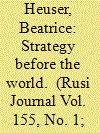

|
|
|
|
|
| Publication |
2010.
|
| Summary/Abstract |
Far from being purely a product of the twentieth century, the present understanding of 'strategy' has many reflections in antiquity and beyond. The history of the concept is a rich one, with wisdom carried through the ages rejecting the value of military victory simply for its own sake. Chief amongst these timeless lessons is that war must serve a political purpose and ultimately ensure a better, more just peace than existed antebellum.
|
|
|
|
|
|
|
|
|
|
|
|
|
|
|
|
| 8 |
ID:
107332
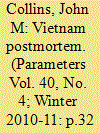

|
|
|
| 9 |
ID:
152962


|
|
|
|
|
| Summary/Abstract |
The concept of military victory has become opaque and quite different from the days of the industrial wars. Full military victory through total annihilation of the enemy has yielded to more complex ways of achieving political objectives. Eventually the understanding of the fact that the war is unwinnable on martial terms shifts insurgent strategy to one of survival, normally peace talks. It is this very shift of strategy, albeit the absence of insurgent annihilation, that constitutes the core of military victory for the government. Politicians and decision makers, if not military forces, blinded by the victory idea of the past, are unable to understand this reality. Hence, when peace talks are held, they are approached as the end of conflict rather than a shift to war by other means. This gives the upper hand to the insurgents.
|
|
|
|
|
|
|
|
|
|
|
|
|
|
|
|
| 10 |
ID:
122940


|
|
|
|
|
| Publication |
2013.
|
| Summary/Abstract |
The most common explanation for military victory and defeat is numerical preponderance. This is the causal assertion that the preponderant will use their material advantage optimally and win the military conflicts they engage in through attrition. When it comes to battle, more is better, whether it be troops in the field or raw economic potential. Regrettably, this big battalions theory has rarely been tested, particularly against a series of cases with great historical breadth. This article analyzes data from 754 battles spanning nearly 3,500 years, and contrasts these empirical details against the core hypotheses of preponderance theory. Unfortunately for the theory, the returns to preponderance are highly ambiguous. Historically, armies both large and small emerge victorious in nearly equal fashion-a result highly contrary to the theory's central claim.
"We are practically through the enemy's defences, the enemy has only flesh and blood against us."
|
|
|
|
|
|
|
|
|
|
|
|
|
|
|
|
| 11 |
ID:
116778


|
|
|
|
|
| Publication |
2012.
|
| Summary/Abstract |
The American Civil War (1861-1865) and the Wars of German Unification (1864-1871) have overshadowed the military history of the Second War of Italian Unification (1859-1861). Yet, this war witnessed the integral use of railroads and steam-powered navies to achieve military victory. The histories immediately following the war purposely obscured the extensive military planning and the premeditation of the Franco-Piedmontese general staffs. The Second War of Italian Unification should be given greater attention as one of the first "modern" wars of the industrial age.
|
|
|
|
|
|
|
|
|
|
|
|
|
|
|
|
| 12 |
ID:
151765


|
|
|
|
|
| Summary/Abstract |
Wars do not end when the last shot is fired. War planning has failed to demonstrate an understanding that victory requires consolidation and the emergence of a more healthy society. The most prominent recent example is the Second Iraq War, but the failure reaches back to the American Civil War. This essay is less concerned with the moral obligation to reconstruct after war than the practical necessity of jus post bellum. In order to learn how to achieve such a consolidation of military victory, a shift in mindset is required from both civil and military policy-makers and planners. A change in practice is required at the very beginning of planning for war. “Whole of government” has been an empty phrase, but experience dictates that an unprecedented degree of domestic and international cooperation is required.
|
|
|
|
|
|
|
|
|
|
|
|
|
|
|
|
| 13 |
ID:
111587


|
|
|
|
|
| Publication |
2012.
|
| Summary/Abstract |
This paper assesses the relative importance of force employment as a cause of military victory. It focuses on the adoption of the modern system in interstate wars since 1917. Using cases, contingency tables, and regression analysis, we find that war participants who use the modern system are significantly more likely to succeed in decisive battlefield engagements. However, the modern system does not predict victory at a higher rate than more traditional unit-level explanations for combat effectiveness, suggesting that it might function as a causal mechanism linking factors like regime type and material endowments with martial capabilities. Exploring the possible links between unit-level explanations of military power and the organizational-level force employment indicators, we find that more materially powerful states and democracies tend to implement the modern system at a higher rate than other types of actors, but more extreme autocracies also frequently adopt. Combined, these findings suggest the relevance of continuing to explore how organizational-level variables impact military effectiveness.
|
|
|
|
|
|
|
|
|
|
|
|
|
|
|
|
|
|
|
|
|